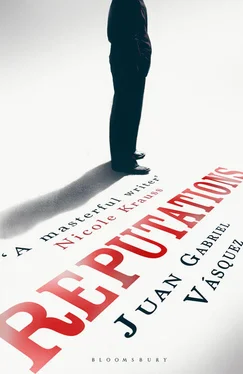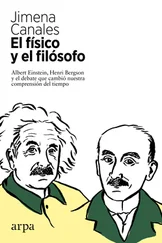‘But you live far away,’ said Samanta. ‘They’d have to cross the entire city. They come as far as this?’
‘They’re very kind,’ said Mallarino.
‘They spoil you,’ said Samanta.
‘I suppose so,’ said Mallarino.
‘It must be that you’re important,’ said Samanta with a smile.
‘Must be.’
‘And how does it feel?’
‘How does what feel?’
‘Being important. Being a country’s conscience.’
‘Look,’ said Mallarino, ‘we live in confusing times. Our leaders aren’t leading anything, much less telling us what’s going on. That’s where I come in. I tell people what’s going on. The important thing in our society is not what goes on, but who tells us what’s going on. Are we going to allow ourselves to be told only by politicians? That would be suicide, national suicide. No, we can’t rely on them, we can’t be satisfied with their version. We need to look for another version, from other people with other interests: from humanists. That’s what I am: a humanist. I’m not a graphic jokester. I’m not a cartoon sketcher. I am a satirical illustrator. It has its risks as well, of course. The risk of turning into a social analgesic: the things I draw become more comprehensible, more easily assimilated. It hurts us less to confront them. I don’t want my drawings to do that, of course I don’t. But I’m not sure it can be avoided.’
Samanta took down the dictation diligently. Mallarino watched her copying it down in her notebook and reading over what she’d written with her big eyes even beneath the roof of her serious brow. ‘Could we go to your studio?’ she asked, and Mallarino nodded. He pointed towards a darkened corridor and, at the end of the corridor, some steps of polished wood; he let her go ahead of him, in part out of chivalry, in part to observe the shape of her body through her skirt as she started up the steps. Mallarino had given many interviews lately, but this time, for some reason, was different: this time he wanted to talk. He felt loquacious, communicative, open and prepared to reveal himself. Perhaps it was the recent impression of his night with Magdalena, or perhaps the notion that his life, from this morning on, was a different life, but suddenly he’d started telling anecdotes, to do what he never did: talk about himself. He spoke of the day when a mayor changed his mind after a drawing was finished, and Mallarino resolved the matter by drawing another speech bubble with three short words: Or maybe not. He spoke of the businessman who once called him to ask him to stop drawing him the way he used to look, now that he’d bought new glasses and had his protruding teeth fixed, but Mallarino kept drawing him the same way: wasn’t it unfair? ‘One time nothing occurred to me,’ said Mallarino. ‘It’s unusual, but it happens. I drew myself with a cup of coffee, with a blank piece of paper and a thought bubble with the light bulb of ideas completely dark. I sent the editor a note saying look, nothing has occurred to me. I have to submit the cartoon and not a single idea has occurred to me. I’m sorry. You decide whether to publish it or not. The cartoon was published. The next day I began to receive congratulatory calls. Everybody was congratulating me. It turns out the day before there was a massive power cut in one of the poorest neighbourhoods of Medellín. The cartoon was interpreted as criticizing the indolence of the administration, etc. I never told them the truth.’
They had arrived at the studio. The afternoon light entered through the window that overlooked the city, that light smeared with mist, with dirty smoke, as if arriving tired from the other side of the plain. ‘The centre of cre-ation,’ said Samanta Leal, stopping in the middle of the room, right below the skylight which bathed her in its now scant light, and spinning round, sad lost caryatid, to devour with her eyes the filing cabinet, grey and metal and noisy, that kept watch over the room from one corner, and then the shelf of instruments, the hydraulic chair and work table, a large wooden board set at an exact twenty-two-degree angle that leaned like a ramp to mount a cork wall, or so the cork wall could send down, like a toboggan, newspaper clippings, sketches, to-do lists and photos of current public figures, victims or beneficiaries (mostly victims) of his caricatures. ‘Can you turn on the light?’ asked Samanta. ‘It’s hard to see.’ Obliging (but why, why so enthusiastic?), Mallarino flipped the switch; two halogen lamps came on in the ceiling and a wall covered in frames appeared out of nowhere.
‘It’s my altar,’ said Mallarino. ‘I work facing the cork wall: that’s my daily task, what I’m working on at the moment. But when things get annoying, when I start to ask myself why I got into this, or when reality gets so filthy, it doesn’t deserve to be drawn. . then I come and stand over here, in front of this wall. A couple of minutes, that’s enough. It’s like confession for a Catholic, I imagine. All these are my personal priests, the ones who hear me, who give me advice. Do you want me to explain?’
But she didn’t answer. ‘Do you want me to tell you about this wall, señorita?’ Mallarino insisted, but Samanta had stopped looking at him, stopped taking notes, and her expression was no longer diligent and attentive; she’d suddenly acquired a concentrated and at the same time empty expression, like a crazy person.
‘Ah, yes,’ he heard her say to no one, ‘here it is.’
Five little words, or four words and an interjection, nobody would have believed them capable of inaugurating such a long night. Twenty-four hours later, remembering that precise instant, he would admire the composure with which Samanta walked over to the wall to take a closer look at one of the illustrations, as if she’d discovered a new caricaturist instead of leaning over the precipice of her misfortune. Mallarino knew that he was not now going to tell her about Ricardo Rendón or discuss the stinger coated in honey, that he wouldn’t explain the James Gillray drawing of Napoleon cutting a big piece of a Europe-shaped cake, that he wouldn’t show her da Vinci’s grotesque heads nor would he mention Porta or Lavater, for whom the character of a man can be found in the structure of his face. He knew, knew with total conviction, when he saw her turn round there, in front of the image of King Louis-Philippe as Daumier had drawn him in 1834. Three distinct faces miraculously fitted within that pear-shaped head: one young and content, another pale and bitter, another sad and in shadow. The combination was grotesque, something no one would want to meet by surprise in the middle of the night. And instead of asking about the caricaturist or the caricatured one, instead of accepting explanations about the shape of the head and the triple expression on the face, Samanta began to say in a weary voice that he’d have to forgive her, that up till then she’d been lying, Señor Mallarino, and the entire visit was an act, for she was not a journalist, nor was she interested in interviewing him, nor was she an admirer of his, but she’d had to invent the whole lie, the false identity and pretend interest, to get inside this house and walk around it and look for that strange head she’d seen only once before, many years earlier, when she was a little girl and her life was made up of certainties, when she was a little girl and she had her whole life ahead of her.
There are women who do not preserve, on the map of their faces, any trace of the little girls they once were, perhaps because they’ve made great efforts to leave childhood behind — its humiliations, its subtle persecutions, the experience of constant disappointment — perhaps because something’s happened in the meantime, one of those private cataclysms that don’t mould a person but raze them, like a building, and force them to reconstruct themselves from scratch. Mallarino looked at Samanta Leal and tried to catch a glimpse in her features of some shape (the curve of the frontal bone where it reaches the space between the eyebrows, the way the earlobe joins the head) or perhaps an expression he’d seen on the face of the child twenty-eight years ago. And he could not: that child had gone, as if she’d refused to go on living in that face. Although it was true, on the other hand, that he’d only seen her once and over the space of a very few hours, and perhaps his memory, which had always allowed him to recall the essential features of any face with a surgeon’s precision, was now starting to deteriorate. If that were the case, the deterioration could not be less opportune, for now Samanta Leal, from whose face a little girl had vanished, was urgently asking him to remember that little girl and her visit to this house in the mountains in July of 1982, and not just that, but she was also asking him to remember the circumstances of that long-ago visit, the names and distinguishing marks of those present that afternoon, everything Mallarino saw and heard but also (if possible) what the rest of them saw and heard. ‘Remember, please,’ Samanta Leal said to him. ‘I need you to jog your memory.’ And he thought of that curious turn of phrase, to jog a memory , as if memory were something we could take out and exercise, or nudge into action, by way of certain well-chosen materials, by the mere effort of physical work. Memory would then be one of those horrible fountains from the quarries in the hills that are sold by the roadside and that anyone could bring to life if they had talent and tools and obstinacy. Mallarino knew it wasn’t like that, and yet here he was now, trying to extract the sculpture from the stone, sitting in front of a woman awaiting an answer beside the now darkened window: the whole house leaned over the glowing city, as if spying on it; Mallarino saw the luminous stitches against the black background (the city converted into a backlit, embroidered piece of fabric) and, in the distance, floating in the night air, planes waiting their turn to land; and he thought about the men and women who at that moment were occupying those illuminated spaces and trying, like him, to remember, remember something important, remember something banal, but always to remember, that’s what we all devote ourselves to all the time, that’s where our meagre energies go. It’s a poor sort of memory that only works backwards , he thought again, and again he wondered where those words came from. That’s what this was about, looking back and bringing the past towards us. ‘Remember, please,’ Samanta Leal had said to him. Bit by bit, memory by memory, Mallarino was remembering.
Читать дальше












